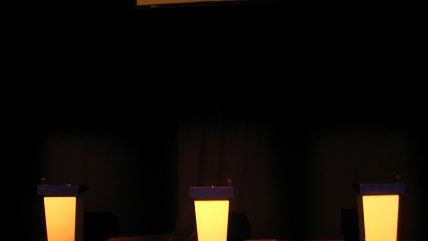Where Are All the Democratic Presidential Candidates?
Passing on the shit storm?


Hillary Clinton is running for president, right? She pulls 60-ish percent in polls of Democrats this early out, holding an "unprecedented" lead in New Hampshire, which she won by less than 10,000 votes over eventual nominee Barack Obama. Like most putative candidates, she says she doesn't know if she's running yet. But who else is there to run on the Democratic side? A "Draft Joe Biden" campaign's been started, progressives are looking for their next great hope, but the Democratic bench appears bereft of candidates. Republicans will certainly have more senators running for president than Democrats, but there's not a lot of Democratic governors loud on the radar yet either. Why? What's happened to the Democratic Party?
After 2002 midterm elections, some political pundits were ready to write off Democrats as a "permanent minority." Two years later saw the second-consecutive photo finish for a presidential race, with John Kerry, the blandest candidate Democrats could find, losing to incumbent George W. Bush by a close margin. Pretty good showing for a "permanent minority" with an awful candidate. After Barack Obama won the 2008 presidential election by a larger margin than any presidential candidate in a generation, Democrats were ready to hoist a permanent minority label on Republicans. 2010 saw a return to the historical trend of the president's party losing in his first midterm, fueled by the unpopularity of Obamacare, the largest (only?) major legislative initiative pushed by the Democratic Congress of 2009-2010. Barack Obama's re-election in 2012, the weakest showing of any incumbent president who won a re-election, led to talk of a demographic shift that, you got it, would relegate Republicans to a permanent minority.
A year and a half from Election Day 2016, however, and there aren't many serious candidates for the Democratic nomination. In one-party, mostly Democratic cities the mayoral primary is the most important election of the cycle because the general election doesn't matter. Obviously not so for 2016. Hillary Clinton—the Democratic candidate everyone expects to run—is polling ahead of any potential Republican challenger but as the Republican primary race takes shape, that lead is declining. "Everyone" may know Clinton but they don't know her positions. Without a primary process to vet her positions, Clinton, if she's the nominee, will be at a disadvantage.
Hillary Clinton is as close to a pre-selected candidate as this cycle'll see. Conventional wisdom suggests Republicans choose their nominee based on whose "turn" it is following the previous election. Bob Dole, John McCain, and Mitt Romney all finished second in the primary race the cycle before they were nominated. Yet this time it's Democrats with the seemingly pre-selected candidate. It's actually nothing new. Clinton played the same role in 2008 but paid millions of dollars to campaign advisers who didn't understand how primary processes work. In 2004, Kerry seemed a fait accompli and 2000 was Al Gore's year. Walter Mondale, the 1984 candidate, was Jimmy Carter's vice president. Bill Clinton may have come out of nowhere, but 1992 was a year few Democrats wanted to go up against a then-popular incumbent president. Democrats may be just as fond of coronations as Republicans, and more so this cycle.
Vox.com claims Clinton remains the only serious potential candidate on the Democrat side because she's "crushing the opposition." Or she could be sucking all the air out of the room, preventing anyone else from lighting a match. Hillary Clinton is a different person from her husband, but historically her run might most closely resemble the third term sought by former president Teddy Roosevelt in 1908. He lost the Republican nomination despite winning a series of primaries and went on to lose to Woodrow Wilson as a third party candidate, finishing ahead of the incumbent Republican.
Clinton announced her candidacy for the 2008 election in January 2007, feeling the pressure of candidates like Barack Obama and John Edwards, who were also looking to enter the race early. Al Gore, the presumptive 2000 nominee, announced his campaign in June 1999. He faced one opponent, Bill Bradley, who almost defeated him in New Hampshire. Hillary Clinton is a weaker candidate than Al Gore, who lost the 2000 election. She isn't running from a formal position like Gore was, nor is she tied to a highly popular incumbent who presided over relative economic calm (well, she's tied to her husband—but he left office 16 years ago, and most people understand she's not her husband). After Gore lost, Democratic strategists criticized him for distancing himself from Bill Clinton, who, while popular, was also scandal-ridden. His wife is scandal ridden, too. She left office as secretary of state in 2013 and returned to the news cycle with an almost unbelievable story about using her own personal server to send State Department emails in brazen disregard for nominal transparency measures. She's far from a perfect candidate and far from a shoe-in for the presidency. So where are all the other Democratic candidates?
Joe Biden could well run. A draft campaign by former staffers has already been launched. There also draft campaigns for Sens. Bernie Sanders (Vt.) and Elizabeth Warren (Mass.). Former Sen. Jim Webb's name has been floated as "anti-Hillary" candidate as well. And Senate Minority Leader Harry Reid (Nev.) joined a call by Super PAC "Ready for Boldness" to find the progressive non-Hillary candidate. A few more senators might join that race. Barack Obama went from the Senate to the White House, but he had enough glamour to get him there. None of the current crop of Democrat senators seem to have that quality, and it only helps with a successful campaign, not a successful presidency.
What about governors? Andrew Cuomo, the two-term governor of New York, says he's not running and is actually acting like it. California's Jerry Brown turned 77 this week. More importantly for both men, and most of the other 16 Democratic governors around the country, they're dealing with serious fiscal crises in their states, and there are no solutions that don't upset some component of the Democratic base that's also exacerbated the problem. Teachers unions hate Cuomo even as he argues his budget is the most "pro-teacher" in the state's history. A slew of unions lined up to fight Brown's attempts at pension reform. His budgets have been boons to the unions, choosing to ignore the debt disaster fast approaching. Former Maryland Gov. Martin O'Malley may run for the nomination, too. He served two terms as governor of Maryland, and voters in the traditionally-blue state elected a Republican to succeed him. The state faces up to a $1.2 billion budget shortfall this year. O'Malley's emerged as one preference of Democratic voters if Clinton doesn't run. In Chicago, meanwhile, that same progressive wing looking for a non-Hillary candidate came out in full force to support Chuy Garcia over incumbent mayor Rahm Emanuel in Chicago, because Emanuel has chosen not to completely ignore his city's fiscal problems. Bill Clinton may have managed to balance a couple of budgets with a Republican Congress, but Hillary Clinton isn't even trying to pretend to be a candidate of fiscal restraint.
A long time ago, back in 2008, Barack Obama paid a lot of lip service to fiscal discipline. It was hopeful but ultimately malarkey. Whether Obama ever believed in fiscal discipline is irrelevant—he didn't practice it, spending the first two years of his presidency spending money with the promise of lowering the unemployment rate in a way the spending never did. That fiscal recklessness may have something to do with the lack of Democratic candidates. In 1992, few Democrats wanted to run against George Bush. In 2016, few Democrats appear to want to run against Barack Obama, and he's left a legacy any Democrat will have to repudiate at least in part in order to win. Obamacare is flawed and the healthcare system is still "broken." "Bush's wars" continue in Afghanistan and even, through the campaign against ISIS, in Iraq. Politicians, Democrats and Republican, continue to promise constituents the moon and spend like they're actually going to deliver it. Promising more isn't just dishonest; it's delusional. It takes a lot of economic illiteracy not to see that. Candidates lined up in 2008 to succeed George W. Bush. He may have left a mess but it was at least perceived by his potential successors as a solvable one. Eight years' worth of mess later, candidates are unsurprisingly harder to come by.


Show Comments (63)